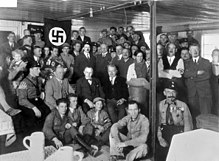
An NSDAP meeting in December 1930, with Hitler in the centre
The Reichstag's initial opposition to Brüning's measures led to premature elections in September 1930. The republican parties lost their majority and their ability to resume the grand coalition, while the Nazis suddenly rose from relative obscurity to win 18.3% of the vote along with 107 seats. In the process, they jumped from the ninth-smallest party in the chamber to the second largest.[61]
In September–October 1930, Hitler appeared as a major defence witness at the trial in Leipzig of two junior Reichswehr officers charged with membership of the Nazi Party, which at that time was forbidden to Reichswehr personnel.[62] The two officers, Leutnants Richard Scheringer and Hans Ludin, admitted quite openly to Nazi Party membership, and used as their defence that the Nazi Party membership should not be forbidden to those serving in the Reichswehr.[63] When the Prosecution argued that the Nazi Party was a dangerous revolutionary force, one of the defence lawyers, Hans Frank had Hitler brought to the stand to prove that the Nazi Party was a law-abiding party.[63] During his testimony, Hitler insisted that his party was determined to come to power legally, that the phrase "National Revolution" was only to be interpreted "politically", and that his Party was a friend, not an enemy of the Reichswehr.[64] Hitler's testimony of 25 September 1930 won him many admirers within the ranks of the officer corps.[65]
Brüning's measures of budget consolidation and financial austerity brought little economic improvement and were extremely unpopular.[66] Under these circumstances, Hitler appealed to the bulk of German farmers, war veterans and the middle class, who had been hard-hit by both the inflation of the 1920s and the unemployment of the Depression.[67]
In September 1931, Hitler's niece Geli Raubal was found dead in her bedroom in his Munich apartment (his half-sister Angela and her daughter Geli had been with him in Munich since 1929), an apparent suicide. Geli, who was believed to be in some sort of romantic relationship with Hitler, was 19 years younger than he was and had used his gun. His niece's death is viewed as a source of deep, lasting pain for him.[68]
In 1932, Hitler intended to run against the aging President Paul von Hindenburg in the scheduled presidential elections. His 27 January 1932 speech to the Industry Club in Düsseldorf won him, for the first time, support from a broad swath of Germany's most powerful industrialists.[69] Though Hitler had left Austria in 1913 and had formally renounced his Austrian citizenship on 7 April 1925, he still had not acquired German citizenship and hence could not run for public office. For almost seven years Hitler was stateless and faced the risk of deportation from Germany.[70] On 25 February 1932, however, the Nazi interior minister of Brunswick (the Nazis were part of a right-wing coalition governing the state) appointed Hitler as administrator for the state's delegation to the Reichsrat in Berlin. This appointment made Hitler a citizen of Brunswick.[71] In those days, the states conferred citizenship, so this automatically made Hitler a citizen of Germany as well and thus eligible to run for president.[72]
The new German citizen ran against Hindenburg, who was supported by a broad range of nationalist, monarchist, Catholic, republican and even social democratic parties. Another candidate was a Communist and member of a fringe right-wing party. Hitler's campaign was called "Hitler über Deutschland" (Hitler over Germany).[73] The name had a double meaning; besides a reference to his dictatorial ambitions, it referred to the fact that he campaigned by aircraft.[73] Hitler came in second on both rounds, attaining more than 35% of the vote during the second one in April. Although he lost to Hindenburg, the election established Hitler as a realistic alternative in German politics.[74]
0 comments:
Post a Comment